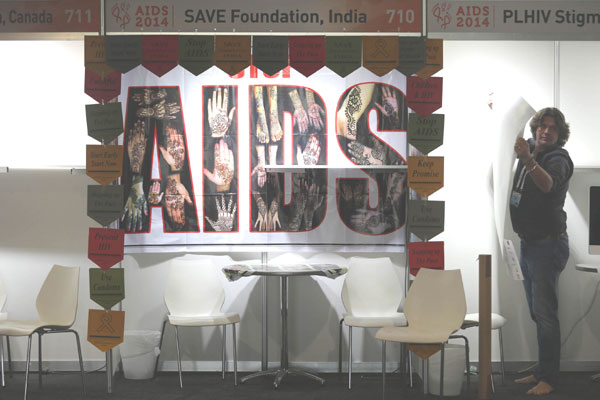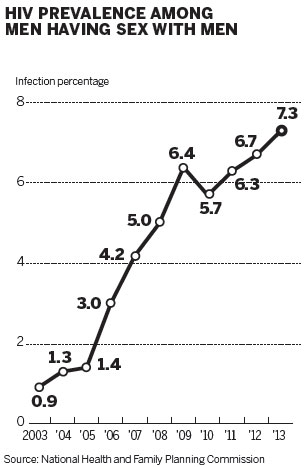Pepping up prevention
By Shan Juan (China Daily) Updated: 2014-09-26 09:43
 |
|
A staff member of the 20th International AIDS Conference 2014 prepares posters at a booth in Melbourne on July 20. Zhang Xiaoli / For China Daily |
Free PEP
Peter Reis, senior vice-president of the AIDS Healthcare Foundation in the US, said: "PEP in my opinion is better than nothing in cases of exposure other than by accident like a condom break."
Free PEP procedures are available at outlets of the foundation.
In Australia, the government provides free PEP but repeated users will be asked to give a reason, according to Michael Frommer, policy analyst of the Australian Federation of AIDS Organizations.
"Behavior interventions would be given to those who turn to PEP after frequent unprotected sex," he said.
China, as Wu noted, has piloted another prevention option called pre-exposure prophylaxis (PrEP) among gay men in some cities, which is recommended by the WHO as well.
PrEP is for people who are at high risk of getting HIV. It is meant to be used consistently, as a pill taken every day, and to be used with other prevention options such as condoms.
"PrEP did work well in some international studies but it's not so well-received among the Chinese gay men population in China," he said, citing results from a survey of more than 1,000 gay men in Shanghai.

Less than 20 percent of the respondents said they were willing to accept PrEP but only 3 percent finally took it, survey results showed.
"It's hard to talk somebody without HIV into having anti-retroviral treatment, simply for prevention purposes," Yang said, citing the fear of potential drug adverse reactions as a reason.
Also, "many of the gay men still think HIV/AIDS is far away from them, and how that would impact condom use remains to be studied," he said.
Sun Jiangping, deputy director of the National Center for AIDS/STD Control and Prevention, conceded that China has hit a bottleneck for HIV/AIDS intervention.
Top challenges include how to further decrease the incidence rate among key groups like MSM and how to keep expanding treatment coverage.
Civil groups combating the epidemic have been instrumental in devising and introducing countermeasures and useful tools.
Among the services of the China Rainbow Health Organization in Beijing, an advocate for the prevention and treatment of HIV/AIDS, free home-mailing of rapid HIV testing is well-received among gay men, according to its director, Xiao Dong.
"Testing is the first step to early detection and treatment and such services attract those who avoid testing at outlets for fear of their privacy being exposed," he said.
Lu Hongyan, director of an institution involved in the prevention and treatment of sexually transmitted diseases and HIV/AIDS under Beijing's Center for Disease Prevention and Control, said they have been working in partnership with such community-based organizations to "better reach out to the key groups for intervention".
- Govt encourages people to work 4.5 days a week
- Action to be taken as HIV cases among students rise
- Debate grows over reproductive rights
- Country's first bishop ordained in 3 years
- China builds Tibetan Buddhism academy in Chengdu
- Authorities require reporting of HIV infections at schools
- Typhoon Soudelor kills 14 in East China
- Police crack down on overseas gambling site
- Debate over death penalty for child traffickers goes on
- Beijing to tighten mail security for war anniversary







